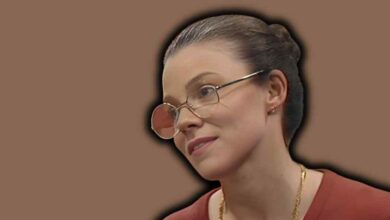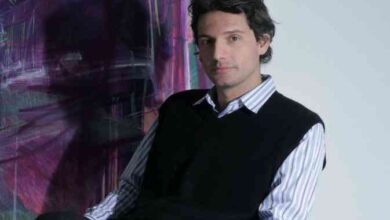Geoffrey Streatfeild – The Quintessential British Actor Balancing Theatre and Screen

Geoffrey Streatfeild, born in 1975 in London, England, stands among the most respected British actors of his generation. His journey from theatre to television and film reflects not only immense talent but also a deep respect for the craft of performance. Coming from a family connected to the British Army—his brother Major Richard Streatfeild served in the Rifles—Geoffrey grew up surrounded by discipline and dedication. This background later influenced his portrayals of military and authoritative characters, adding authenticity to his stage and screen performances.
From his early days, Streatfeild demonstrated a fascination with storytelling. While details about his childhood and formal training remain relatively private, his refined acting style suggests classical training, possibly rooted in the traditions of British theatre institutions such as the Royal Academy of Dramatic Art (RADA). His natural articulation, command over language, and understanding of complex characters reveal an actor shaped by both education and experience.
Beginning of His Theatre Journey
Theatre was Geoffrey Streatfeild’s first home. His connection to live performance became the defining element of his early career. He joined the Royal Shakespeare Company (RSC), where he worked on several of William Shakespeare’s iconic plays. Among his most celebrated performances were in Henry IV and Henry V, where he portrayed Prince Hal with remarkable nuance. The transition from the reckless prince to the dignified king demanded emotional maturity and precision, both of which Streatfeild delivered with quiet intensity.
His time at the RSC proved transformative. Performing Shakespeare’s texts daily, Streatfeild developed a profound understanding of rhythm, diction, and emotional range. The critics praised his ability to make centuries-old dialogues feel modern and relatable. He was not just playing a role—he was living it. Each gesture, tone, and pause carried significance.
Beyond Shakespeare, he explored a range of classical and modern works, from comedies to tragedies. Productions such as The Beaux’ Stratagem and Journey’s End displayed his versatility. Whether embodying a war-weary soldier or a charming aristocrat, Geoffrey always brought sincerity to the stage. He earned a reputation as an actor capable of both vulnerability and strength—a rare blend that made his performances unforgettable.
Transition to Television and Film
After establishing himself in theatre, Geoffrey Streatfeild transitioned into television and film, where his reputation for thoughtful, emotionally rich performances quickly caught the attention of directors. He appeared in The Other Boleyn Girl (2003) and Kinky Boots (2005), two films that allowed him to showcase his adaptability. While his roles were not always in the spotlight, his performances consistently elevated the scenes he was part of.
Television, however, brought him into broader public recognition. One of his most significant roles was in the hit BBC series Spooks (known internationally as MI-5). He portrayed Calum Reed, a young and ambitious MI5 officer whose intelligence and moral questioning resonated with viewers. His portrayal captured the inner conflict of a man navigating loyalty, duty, and morality within a high-pressure intelligence agency.
In The Thick of It, the acclaimed British political satire, Streatfeild demonstrated a completely different side of his acting ability. He played a character entangled in the absurdities of politics, proving that his sense of timing and delivery extended beyond serious drama into sharp, intelligent comedy. His presence brought credibility to every scene he entered, showing his range as a performer who could adapt effortlessly to varied genres.
A Dedicated Theatre Performer
Despite success in film and television, Geoffrey never abandoned his roots in theatre. He continued to work on stage productions, collaborating with prestigious institutions such as the National Theatre and the Royal Court Theatre. His portrayal in The History Boys, one of Britain’s most beloved stage productions, cemented his standing among the country’s elite actors.
Critics frequently note how Streatfeild seems most at home under the stage lights. Theatre, unlike film, demands consistency and stamina—qualities Geoffrey embodies naturally. His ability to captivate live audiences night after night underscores his professionalism and passion. Each performance reflects the depth of preparation that only years of dedication can cultivate.
Personal Life and Influence
Beyond his professional achievements, Geoffrey Streatfeild’s personal life also adds dimension to his story. He was married to the talented actress Nikki Amuka-Bird between 2003 and 2010. Their marriage brought together two respected British artists, both known for their commitment to performance. Following their separation, Streatfeild has been associated with actress Anna Madeley, another prominent name in British theatre and television.
What stands out most about Geoffrey is his discretion and humility. Unlike many actors drawn into the noise of celebrity culture, he has maintained a grounded, private approach to fame. His focus remains firmly on his craft rather than public attention. This quiet dignity has earned him respect within the acting community and among audiences who appreciate authenticity.
Acting Style and Approach
Geoffrey Streatfeild’s acting style is often described as disciplined yet deeply emotive. He embodies the British tradition of subtle expression—his characters rarely rely on exaggerated gestures or dramatic flourishes. Instead, his power lies in controlled delivery and emotional honesty. His background in classical theatre gives him precision, while his natural instincts add humanity.
Directors and co-actors frequently commend his ability to listen, react, and collaborate. In ensemble productions, he stands out without overshadowing others, contributing to a collective rhythm. In solo moments, he commands attention effortlessly. This balance between humility and presence is what makes him one of the most dependable actors of his generation.
Recognition and Impact
Over the years, Geoffrey Streatfeild has built a reputation as an actor’s actor—admired not only by audiences but also by peers. His consistency, professionalism, and ability to shift between theatre, television, and cinema have made him a model for aspiring British performers. He may not dominate headlines like mainstream celebrities, but his contribution to the performing arts is both steady and significant.
In an industry where fame can be fleeting, Geoffrey’s career represents endurance. His performances continue to inspire younger actors to value substance over spectacle. For theatre lovers, he remains a familiar and trusted name; for film and television audiences, he is the quiet professional whose performances linger long after the credits roll.
Recent and Upcoming Work
Even in recent years, Geoffrey Streatfeild remains active across multiple mediums. He continues to appear in major stage productions, including the Royal Shakespeare Company’s revival of The School for Scandal in 2024. His continued dedication to live performance at a time when many actors move permanently to screen work demonstrates his commitment to artistic authenticity.
He also continues to appear in television dramas, lending his voice and presence to complex, layered characters. Whether portraying historical figures, politicians, or everyday individuals, he maintains the same level of depth and empathy.
Legacy and Contribution to British Arts
Geoffrey Streatfeild’s legacy lies not in flashy roles or headline-making controversies, but in craftsmanship. He represents a generation of British actors who bridge the gap between classical theatre and modern storytelling. Through his career, he has upheld the integrity of stage performance while seamlessly adapting to television and film.
His journey reflects the best of the British acting tradition—intelligence, humility, discipline, and emotional truth. Younger actors looking to build sustainable careers can find in him a model of how to balance artistic growth with professional longevity.
As the entertainment industry evolves with digital media and streaming platforms, Streatfeild’s approach serves as a reminder that quality acting remains timeless. Regardless of format, his performances always centre around authentic human emotion—a quality audiences continue to crave.
Conclusion
Geoffrey Streatfeild embodies the spirit of a true British performer. From the grand halls of the Royal Shakespeare Company to the intense close-ups of BBC dramas, his artistry transcends medium and genre. His calm intensity, disciplined craft, and unwavering respect for storytelling make him a standout figure in the modern landscape of acting.
While many actors chase visibility, Geoffrey Streatfeild quietly delivers excellence. His career is not built on fame, but on consistent brilliance—proof that talent, dedication, and integrity can still define success in today’s entertainment world.



